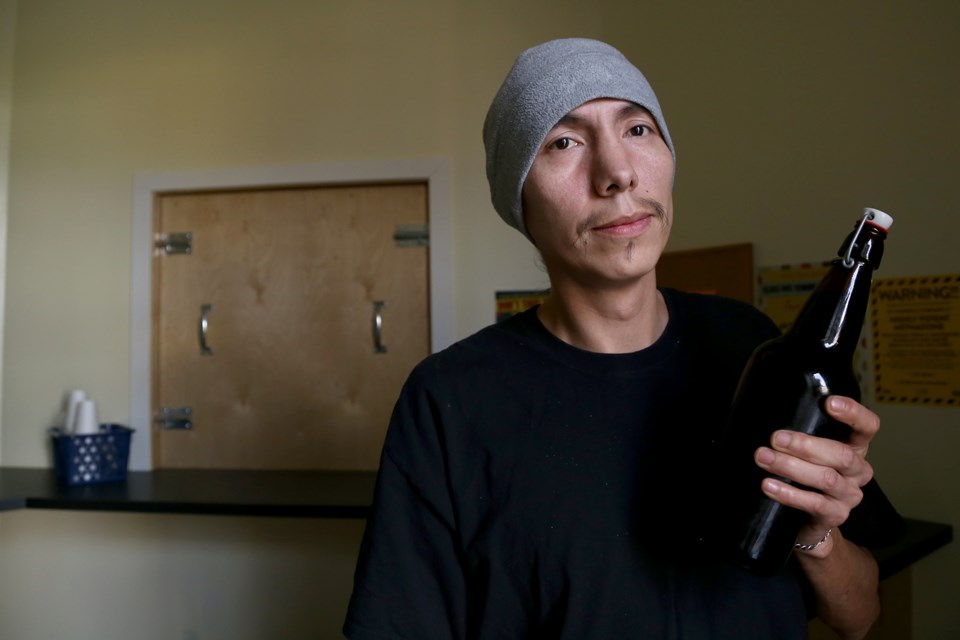The non-profit society that made international news last week for setting up crack pipe vending machines in the Downtown Eastside has embarked on a program that includes severe alcoholics brewing their own beer and wine.
The PHS Community Services Society has introduced an alcohol-making co-op at its drug resource centre on Cordova Street as part of a larger initiative aimed at alcoholics who normally drink rubbing alcohol, hand sanitizer and other high content alcohol-based products.
“We give them something else so they can go out and have the same kind of feeling with it but it’s not going to destroy them as much,” said Tyler Bigchild, who oversees the centre’s co-op. “For me, really, it’s harm reduction.”
Membership in the co-op requires a person to join the centre’s “drinkers lounge” club, which meets once a week with staff. Participants are taught CPR, discuss their health, legal issues and learn about treatment plans to reduce their alcohol intake.
Each member contributes $10 towards the purchase of the brew kits and, in return, can make four to five litres of beer or wine. While the number of participants in the co-op varies each week, membership hovers around 30 people. Another 60 belong to the club but don’t participate in the co-op.
Kailin See, the centre’s director, said the co-op is one component of the society’s efforts to reduce the harm suffered by severe alcoholics, whether they belong to the co-op or not. On a case-by-case basis, the centre exchanges surplus homemade booze to club members not involved in the co-op.
“I’m very strict about it,” See said. “There’s got to be a commitment on that person’s part — they’ve got to be thinking about reduction. It’s very much tailored to that person and their consumption and their goals.”
Twice a day, teams from the centre also search out alcoholics in the neighbouring Oppenheimer Park and surrounding neighbourhood to check on their well-being and ensure they’re hydrated with water, juice and other liquids.
“It’s all a part of creating as many points of contact that we can with a population of people that often don’t make those points of contact,” said See, sitting at a table at the centre with Bigchild and Mark Townsend of the PHS.
The program is an extension of what the PHS offers at two single-room-occupancy hotels it manages in the Downtown Eastside. But the hotel programs are strictly for residents of the hotels and involve store-bought booze.
The centre’s program runs out of a building that operates a needle exchange and is open from 10 a.m. to 4 p.m. Showers, toiletries and free hot breakfasts and lunches are offered, which are attractive to people who otherwise have little.
“The overarching goal is to engage people, bring them off the street and try to mitigate bad things in the lives of people who are suffering,” Townsend said.
The PHS’s venture into so-called harm reduction initiatives is not new for the society. It co-manages the Insite supervised drug injection site and made international news last week after media, including the Courier, reported the society set up two crack pipe vending machines in the Downtown Eastside.
The PHS has been in a battle with opponents of its harm reduction approach to substance abuse, with Prime Minister Stephen Harper’s government leading the criticism.
The Harper government has fought unsuccessfully in the courts to have Insite closed, announced it will shut down a heroin maintenance program and criticized the PHS’s installation of the crack pipe vending machines, one of which is in the society’s centre on Cordova Street; the other is in the Shaldon Hotel on East Hastings.
“People are using drugs, abusing alcohol and doing all these things across the country and all over the place,” said Townsend, noting the drug deaths of actors Cory Monteith in Vancouver and Philip Seymour Hoffman in New York. “You kind of have a choice — you can either let it go on, or you can try and make things better for people who are suffering and, by doing that, make things better for the wider community. That is the pragmatic approach.”



